Euroka Children’s Centre is a 67-place Early learning centre with a team of 30 educators, including seven Early Childhood Teachers (ECTs). Lorriene Bullivant has worked at Euroka for ten years and has been Director for the past two and a half years.
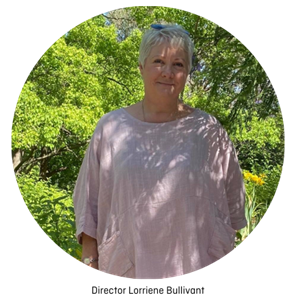 “Our leadership journey started around six years ago”, says Lorriene. “At this time, the director, educational leader and room leaders would meet off site once a month for a leadership meeting. During those meetings, the team developed a shared vision and goals.
“Our leadership journey started around six years ago”, says Lorriene. “At this time, the director, educational leader and room leaders would meet off site once a month for a leadership meeting. During those meetings, the team developed a shared vision and goals.
"We made some great progress during this period,” recalls Lorriene. “However, steps towards quality improvement were not consistent. It was a bit hit and miss and was dependent on the enthusiasm and commitment of a small sector of the team. We researched leadership models and wondered about sustainable leadership. After some reflection, I realised that creating a leadership team potentially marginalised others in the team, creating a “them and us” scenario, which was certainly not our intention.”
When Lorriene took over the role of director, she wanted to remove the conventional top-down, static management often seen in early childhood settings and authentically offer leadership opportunities to all educators as a part of everyday work practice. To support this, educators needed non-contact time to undertake different projects and professional development. To put this theory into practice, meant additional funds were required to support these initiatives.
“We applied to the Department of Education to increase our licensed places, which we were successful in getting” shares Lorriene. “This, along with operating at full capacity for the last two years, has meant that we have built our finances to a point where we have made improvements to our physical environment and we can offer more to our team by way of a distributed leadership model, including non-contact time for all educators. All staff are paid above their relevant award, and all seven ECTs and one Diploma qualified educator are considered educational leaders and receive remuneration for this role plus additional non-contact time each week.”
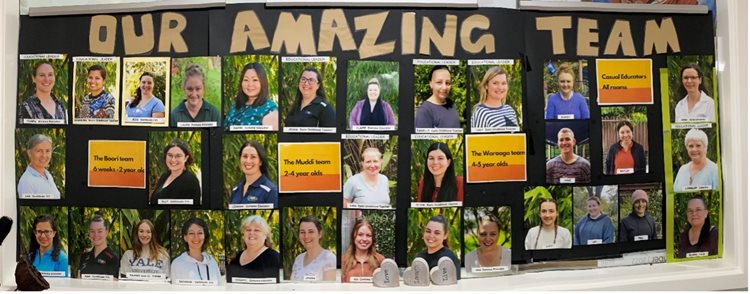
What is a distributed leadership model?
According to Teacher Magazine:
Distributed leadership is primarily concerned with the practice of leadership roles or responsibilities. It equates with shared, collective and extended leadership practice that builds the capacity for change and improvement.
“I wanted to move past the positional notion of leadership and authentically offer leadership opportunities to the whole team," recalls Lorriene. "I believe distributed leadership should be contextualised. Every early childhood setting is different and therefore leadership will look different in each context. I think opportunity is the key.” She adds that implementing this model of leadership at Euroka has inspired, affirmed and challenged educators and promoted effective teamwork, collaboration and a culture of learning.
The benefits of this model can include:
Efficiency
When leadership is allocated more evenly, more decisions can be made without approval from the top. Tasks and projects are often undertaken and completed more quickly as a result.
Productivity
Giving everyone in the team more autonomy over their work fosters trust and ownership. This, in turn, promotes dedication, involvement, growth, and quality improvement.
Innovation
Similar to boosting productivity, autonomy also creates more room for innovation and teamwork. Team members are more inclined to communicate with one another, share information and expertise, and gain from a more solid relationship.
Retention
Valuable team members are more likely to move on if they are not given the opportunity to advance. When everyone has the chance to take the lead and choose their own direction, job satisfaction and retention are increased.
How distributed leadership has been embraced
“Once leadership opportunities were offered to the broader team, some educators leapt in with huge excitement and confidence, while others inched forward tentatively to join others in a project, working in pairs or on a minor project,” says Lorriene, who adds that some projects were completed quite quickly, while others are still ongoing. Collectively, these initiatives have added a huge boost to pedagogical practices, and children and families have been the direct beneficiaries.
In practice, Lorriene has witnessed the building of shared knowledge and vision, a supportive and supported work context and a culturally safe space for all. She says the team have come together in a more collaborative way to build each other up and support each other.
“Everyone is heard and has the opportunity to grow as a professional. It also means that all educators have time away from working directly with children to pursue other areas of interest.”
All educators are encouraged to undertake leadership roles in a capacity that they feel comfortable with, but it is not expected of anyone. For example, educators may work on a proposal, idea or PIP (Personal Interest Project).
Some examples of these projects have included:
- Developing the team's understanding and practices around cultural inclusion
- Inclusion support, mentoring others to understand the process of applying for inclusion support funding and supporting families through the process
- Gender inclusion, including an audit of books and resources to support teaching and learning around gender inclusion
- Reconciliation Action Plan (RAP)
- Policy writing
- ELLA language program
- Spending time in kindergarten classrooms to prepare schools for children and visa versa
- Building community connections
- Music and dance program
- Mental health support and well-being support
- Teaching AUSLAN to the team
- Creating a context-specific curriculum framework
- One educator has been able to realise her passion by spending a full day in the garden each week
These initiatives are undertaken by educators who want to pursue something for their own interest or to share knowledge to inform our practice in new and innovative ways.
ECT Jenna Northcott tells us that she has welcomed the opportunity to take on a few projects over the years including creating a bush kinder framework and a curriculum framework that are specific to Euroka's unique environment.
"I have updated 70 policies and procedures and continue to revise these as needed," says Jenna. "Most recently I have been attending local community meetings with school principals, police and youth teams in the Blue Mountains to get a better understanding of the needs in our community and how we can work together to bridge the gaps to better the lifelong outcomes for all children.
"I feel like I am helping to better Euroka as a whole, share my knowledge and experience with my co-workers and parents and most importantly create safe spaces that meet each child’s individual learning goals."
How this model has benefitted children and families
Lorriene says that the centre’s high staff-to-child ratio allows educators to build authentic relationships with each child and supports children in a social setting and for their individual learning.
“We have goals for each child’s learning which are developed together with each child’s family, the children, and educators. The program is developed with these goals in mind, with a key focus being children’s current interests and what we know children need to know about their community and the world in which they live.”
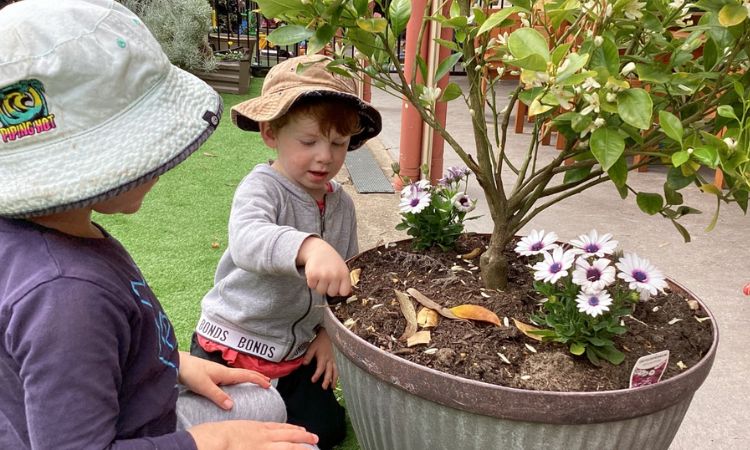
Euroka has 125 children enrolled over the week, catering for children from six weeks to school entry age. Enrolments include children from three Indigenous families and several children who have English as a second language. A high number of children require additional support regarding their learning and inclusion in the program.
The centre has two Indigenous educators and several educators who have English as a second language. "They each bring a rich culture to share," says Lorriene.
Initiatives flowing out of the distributed leadership model have included more focus on inclusion, particularly for local First Nations families.
“Several years ago, we did a cultural audit as a team and realised that whilst we felt passionate about being inclusive and were introducing some lovely experiences with the children, nothing was visible from the street that demonstrated our commitment, especially representing and reflecting First Nations Peoples within our community,” shares Lorriene. “We engaged Auntie Leanne Tobin to create a mural at our entranceway with the greeting “Warami”, meaning welcome, in the local Dharug language. With the assistance of the children, she also painted a community library box built by the Men’s shed and our letterbox, which faces out into the community.”
The centre’s Acknowledgement to Cou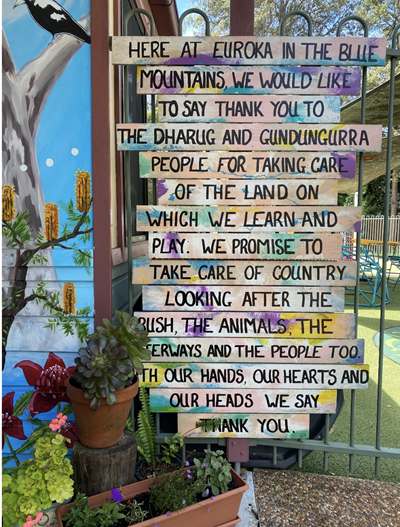 ntry was also developed after the cultural audit. It was written with the children and adopted after gathering input from the families.
ntry was also developed after the cultural audit. It was written with the children and adopted after gathering input from the families.
The Acknowledgement to Country says: "Here at Euroka, in the Blue Mountains, we would like to say thank you to the Dharug and Gundungurra People for taking care of the land on which we learn and play. We promise to take care of Country, looking after the bush, the animals, the waterways, and the people, too. With our hands, our hearts, and our heads, we say thank you."
An audit of the book collection was conducted last year after all books were consolidated into a library and colour coded for ease of access. Two educators had started a gender inclusion PIP, and when searching the library, they realised that books around inclusion were not well represented. Books covering mental health and well-being were also under-represented.
“We did some research which resulted in purchasing some resource books for educators as well as dozens of new books in our children’s library,” says Lorriene. “We have just appointed an educator as our librarian to keep the books in good order and repair. This was another PIP/ leadership opportunity.”
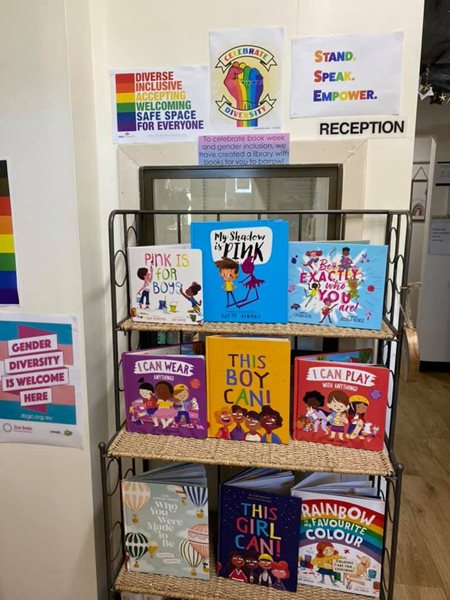
Master classes and WhatsApp chats instead of staff meetings
Traditional staff meetings have been replaced with master classes that are presented by the team for the team. These may be focused on topics that educators have requested more support with or something the presenter is passionate about. These master classes provide an opportunity to have fun and to work and learn together.
“We also periodically invite guest speakers to present a topic of interest,” says Lorriene. “We acknowledge and respect that staff have lives outside of their workplace and therefore offer flexible hours and days of work.”
All staff (including admin and kitchen staff) have access to ongoing training, which is paid for by the centre, and in-house mentoring is offered to team members at all levels.
"I like that each educator's strengths are given a chance to shine at Euroka," says ECT Jenna Northcott. "We are able to find a passion and pursue it and then share what we have learnt with the whole team. It means that we are all given a voice in how Euroka operates."
Further sharing and learning take place through WhatsApp chats. Lorriene says that these chats have been a communication breakthrough and are where a lot of critical reflection takes place. They provide an opportunity for everyone, including young trainees and casual educators, to engage in professional conversations.
Community engagement
Staff at Euroka Children's Centre pride themselves on their involvement in community activities. They are excited to announce that on the 15th of October, they will participate in the Blue Mountains Edible Garden Trail, during which time their garden will be open to the public. They will also have children’s activities and stalls to make it more of a Spring Fair. Their centre will be set up as if it is a normal day, so prospective families can view the centre and chat with the educators. 
Would you like to know more about leadership models?
-member-news-strip-banner.jpg)
Find out more